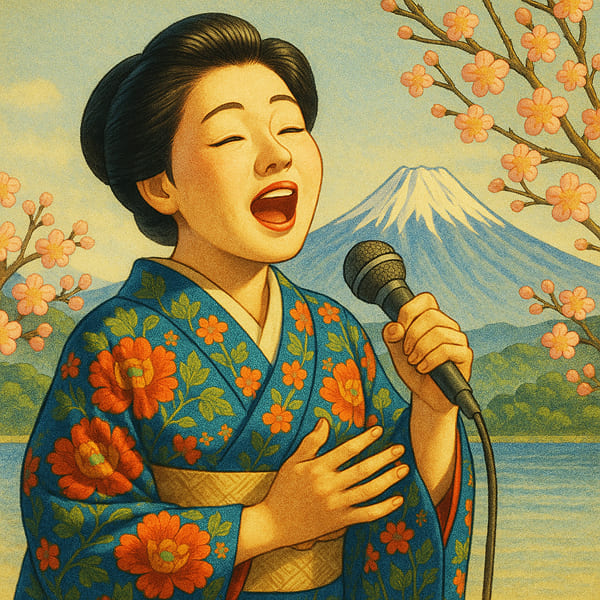Enka: The Soulful Voice of Japan’s Musical Tradition

A trembling voice. A single tear. A melody that carries the weight of generations.
This is Enka—Japan’s soul-stirring ballad of love, loss, and longing.
More than just music, Enka is a heartfelt confession wrapped in poetic lyrics and nostalgic soundscapes. Whether it’s the ache of a hometown left behind, the silent devotion of unspoken love, or the quiet strength of enduring hardship, Enka speaks a language beyond words—the language of feeling.
In this article, we’ll dive into the history, artistry, and emotional power of Enka—discovering why this traditional genre still echoes deeply in modern hearts, from smoky karaoke bars to global stages.
What is Enka Music?
Enka differs significantly from modern J-pop or rock. It focuses on conveying raw emotion through poetic lyrics and traditional melodies, often rooted in Japanese scales. Common themes found in Enka songs include:
- Unrequited or lost love
- Nostalgia for one’s hometown (furusato)
- Life’s struggles and perseverance
- Silent devotion or love left unsaid
Each song tells a dramatic story, making the experience of listening to Enka similar to watching a heartfelt short film or stage play.
The History and Evolution of Enka
Enka’s origins trace back to the Meiji period, where it initially referred to “speech songs” used to spread political messages. The modern Enka we know today, however, emerged during the Taisho and early Showa eras, evolving into a form of sentimental ballad that focused on human emotion and societal changes.
The genre flourished in the post-war era, especially between the 1960s and 1980s, with legendary singers like Hibari Misora, Saburo Kitajima, and Sayuri Ishikawa becoming household names. They helped establish Enka as a staple of Japanese entertainment through TV appearances, radio, and later karaoke.
A small break — a little side note
Experience the powerful voice and passionate spirit of Saburo Kitajima, one of Japan’s most legendary enka singers, in his classic performance of "Matsuri". This energetic anthem captures the essence of Japanese festivals, tradition, and heartfelt emotion—offering a perfect introduction to the world of enka, Japan’s soul-stirring genre of music.
Why Enka Still Captivates Audiences
Though often associated with nostalgia and tradition, Enka continues to resonate with people today.
Emotional Power of Kobushi
The signature kobushi singing technique involves subtle shifts in pitch and vibrato, creating a wave-like sound that heightens emotional expression. Originally found in Japanese folk music, kobushi is central to Enka’s ability to evoke longing and heartfelt emotion.
Cultural Aesthetics: Kimono and Visual Storytelling
Enka performances are often enhanced by the singer’s traditional attire, especially the kimono, which adds elegance and cultural authenticity. Stage designs often feature imagery like snow-covered villages, night trains, or coastal towns—scenes that amplify the mood of the song and draw listeners deeper into its narrative.
Karaoke and Emotional Connection
Enka remains one of the most beloved genres in karaoke culture across Japan. Its lyrical themes and dramatic delivery make it ideal for personal expression. Whether sung at a bar or in private, Enka allows people to release bottled-up emotions and connect deeply with others.
Enka in the Modern Era
While Enka is rooted in tradition, it has seen a creative revival through artists like Kiyoshi Hikawa and Hiroshi Miyama, who blend Enka vocals with modern elements of pop and rock. Their efforts have brought new life to the genre, attracting younger fans both in Japan and abroad.
Thanks to social media and global streaming platforms, Enka is gaining recognition internationally. Foreign audiences have been captivated by the genre’s emotional depth, and many viral videos show global listeners reacting with awe to powerful Enka performances.
A small break — a little side note
Hiroshi Miyama is a celebrated Japanese enka singer, known for his rich voice and dedication to preserving the soul of traditional Japanese ballads.
Born in Kōchi Prefecture, Miyama brings warmth and sincerity to the stage, bridging the generations with songs that resonate deeply with Japanese cultural identity. His performances have earned him a loyal following, and he has also appeared on Kōhaku Uta Gassen, Japan’s prestigious New Year’s music program.
While firmly rooted in enka tradition, Miyama occasionally adds personal flair to his stage presence, making enka more approachable for younger audiences without straying from its essence.
Why Enka Matters Today
Enka continues to serve as a poignant reflection of the Japanese soul. Its timeless messages of sorrow, perseverance, and love resonate universally while remaining deeply tied to Japan’s cultural heritage.
Whether you're a fan of traditional Japanese music or new to the genre, Enka offers a profound listening experience. Even without understanding every lyric, its emotional resonance is unmistakable. For anyone seeking a deeper understanding of Japanese identity, Enka is an essential melody to explore. In a rapidly changing world, Enka remains a gentle voice from the past—guiding us through the present with grace, sorrow, and strength.